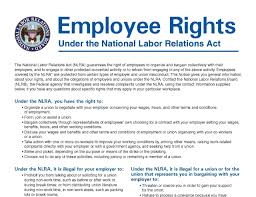 Have you gotten into trouble or been fired because you complained on social media about your boss or employer? Or maybe you were reprimanded for “liking” a fellow co-worker’s Facebook post concerning a work-related issue?
Have you gotten into trouble or been fired because you complained on social media about your boss or employer? Or maybe you were reprimanded for “liking” a fellow co-worker’s Facebook post concerning a work-related issue?
If either of these or a similar scenario has happened to you, you may have been subject to an illegal infringement of your right to engage in protected concerted activity.
Sometimes referred to as a protected collective action, a protected concerted activity is a legally protected action that an employee takes to better her or his workplace conditions and/or employment terms. This right is provided for in the National Labor Relations Act of 1935 (NLRA).
Table of Contents
ToggleNLRA
The NLRA is the key labor law that allows workers to form unions and partake in collective bargaining and is enforced by the National Labor Relations Board (NLRB). The right to protected concerted activity comes from Sections 7 and 8 of the NLRA. Section 7 states that:
Employees shall have the right to self-organization… and to engage in other concerted activities for the purpose of collective bargaining or other mutual aid or protection…
Section 8 states that:
It shall be an unfair labor practice for an employer…to interfere with, restrain, or coerce employees in the exercise of the rights guaranteed in section 7…
Sections 7 and 8 also provide the basis for protecting a worker’s right to use social media to discuss workplace conditions, such as pay, or even indulge in an expletive- and anger-filled rant. However, if an employee is only acting “by and on behalf of the employee himself” or the comments are “mere griping,” then the employee may not enjoy NLRA protections.
What determines whether the employee is protected is very fact specific. Therefore, some notable cases will be discussed below, illustrating how or when these protections are in effect.
Case 1: Hispanics United of Buffalo
Hispanics United of Buffalo (HUB) fired five employees because they posted comments on Facebook regarding a common co-worker who criticized their work performance. HUB fired the five employees on the grounds that the Facebook posts violated HUB’s harassment and bullying policy. The NLRB disagreed and issued a complaint that was heard by an administrative law judge (ALJ). The ALJ sided with the NLRB and the five employees, stating that the five employees’ Facebook posts were a protected concerted activity.
The ALJ concluded that the Facebook comments were related to the work conditions that affected all five employees. This was even though there was no evidence that the five employees intended to take further action to better their work conditions beyond making the Facebook posts. The ALJ further noted that the comments were not made on HUB office equipment, were not made while the employees were working for HUB, and did not constitute harassment.
Case 2: The Bartender Who Complained About Tipping
 In an advisory opinion, the NLRB concluded that a bartender who complained on Facebook about his employer’s tipping policy did not engage in a protected concerted activity because the comments were directed toward a relative, not a fellow employee, and the comments were only made on behalf of himself.
In an advisory opinion, the NLRB concluded that a bartender who complained on Facebook about his employer’s tipping policy did not engage in a protected concerted activity because the comments were directed toward a relative, not a fellow employee, and the comments were only made on behalf of himself.
Case 3: Making Fun of Mentally Disabled Clients
In another advisory opinion, the NLRB found that an employee who directed Facebook comments about her boss’s mentally disabled clients to an outside-of-work friend did not engage in behavior covered by Section 7 as a protected concerted activity.
Case 4: The Employer’s Policy Was Too Broad
Costco had a policy that prohibited employees from making online statements that would “damage the Company, defame any individual or damage any person’s reputation.” The NLRB found that this policy was overly broad in that it could prohibit protected concerted activity since such protected activity could easily include communications that were critical to superiors or Costco.
Case 5: “Liking” on Facebook Is Protected
 The employee of a bar and grill posted in Facebook that because her employer improperly filled out tax forms, she owed more taxes than she anticipated. A fellow employee “liked” the post. When the employer found out about the original post and the “like,” it discharged both employees. The NLRB held that the original post was protected, but even if it weren’t, the “liking” itself would still have been protected.
The employee of a bar and grill posted in Facebook that because her employer improperly filled out tax forms, she owed more taxes than she anticipated. A fellow employee “liked” the post. When the employer found out about the original post and the “like,” it discharged both employees. The NLRB held that the original post was protected, but even if it weren’t, the “liking” itself would still have been protected.
Case 6: Even the F-Bomb Can’t Unprotect a Protected Activity
Just days before a union election, and after an employee and his co-workers allegedly received abusive and disrespectful treatment at work, the employee insulted his manager on Facebook by stating the manager was a ““NASTY MOTHER F***ER . . . F**k his mother and his entire f***ing family… Vote YES for the UNION!!!!!!!” The employee was promptly let go under the employer’s harassment policy. The NLRB found that the firing was unlawful since the comment was a protected concerted activity. The comment was made on the employee’s own time and outside the employer’s facility. In fact, one of the reasons for forming the union was due to the claimed disrespectful treatment by management.
The takeaway from these examples: if you want your social media comments to be protected as a concerted activity, direct them to fellow co-workers and make sure they relate to bettering work conditions and/or inducing group action. Also, the NLRB is fairly lenient in finding that a protected concerted activity has taken place.
Summing It Up
- A protected concerted activity is a legally protected action by an employee or employees with the intention to better their workplace conditions and/or employment terms.
- Concerted activity protections are found in Sections 7 and 8 of the NLRA, with the intention of allowing or facilitating collective bargaining and organized labor.
- The NLRB is somewhat lenient about finding that social media used to discuss work issues will be a protected concerted activity. However, the post must not be directed toward nonemployees and must have the intent to better work conditions or induce group action.





